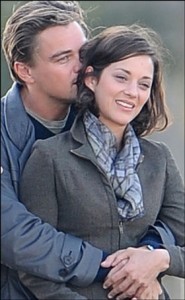
- Memento: A man with amnesia is obsessed with finding the killer of his beautiful wife.
- Insomnia: A detective plays a cat and mouse game with the killer of a beautiful young girl.
- The Prestige: A magician engages in a bitter rivalry with a former friend he blames for the death of his beautiful young wife.
- The Dark Knight: The lives of a masked vigilante and a district attorney are shattered when the woman they both love is killed.
- Inception: A dream thief struggles with the crushing guilt of his wife’s suicide.
- And here’s a bonus: Nolan’s first feature, Following, apparently features a beautiful dead girl as a final twist.
The one movie that doesn’t fit the pattern is Batman Begins. But of course, the love interest dies in the sequel. And there is a dead mom to tide us over.
You know what? I have to Google this.
[five minutes elapse]
Okay, from the single page of the comic I found, Major Force leaves a note on the table that says: “Surprise for you in the fridge. Love, A” “Huh,” says Kyle. “Handwriting looks funny.” This was just silly on Major Force’s part. Was the Major honestly worried that, were it not for this note, Alex’s body would never be discovered? Can we all agree that however great Kyle’s shock, it would be that much greater if he sat around the apartment for two hours, watching ESPN and leafing through his mail, before he finally got up to see if there were anymore Coronas in the OH SWEET MOTHER OF MERCY!!
Hey, I wonder what Major Force did with all the food that was in the fridge?
Now technically, not all of Nolan’s movies rise to the level of fridge stuffing. It’s my understanding that the cliché require that the female character be a real character in the story, that the audience kind of likes, and who is sacrificed so the male character has something to brood about. In Memento, Insomnia, and Inception, the girl is dead before the movie starts. Her identity is defined by her death… which isn’t exactly feminist, but isn’t quite fridge-stuffing. The death of Rachel Dawes in The Dark Knight qualifies, because we’ve had plenty of time to know Rachel before she gets exploded.
In fact, I love all of Christopher Nolan’s movies, and I wouldn’t change them one little bit. That’s what makes this article tricky to write: I don’t know what my thesis is. I have an observation, but I’m not sure how I feel about it. I think it’s clear that Christopher Nolan prefers male characters to female ones, but I don’t think he’s misogynistic. There are great parts for women in Memento, The Prestige, the Batman movies, and even Inception. I suppose there’s a soft misogyny in the way these men are haunted by angelic, sexualized ghosts. It’s kind of Dante. But Christopher Nolan isn’t Michael Bay. Hell, I can’t even recall a sex scene or nudity in any of his work.
So yeah, I don’t think Nolan is sexist. I DO think he has a fascination with dead love interests. Don’t bother searching his Wikipedia page; there’s no dead mother, sister, or girlfriend in his past. Besides, as Wrather noted on this week’s podcast, that kind of psychological determinism is seldom true in real life.
Maybe these dead ladies are an accidental byproduct of the noir world he likes to work in: if you love grim, driven men of action, you need to manufacture something for them to be grim about. The man who actually wrote that Green Lantern story eventually addressed the “woman in the fridge” controversy, saying:
To me the real difference is less male-female than main character-supporting character. In most cases, main characters, “title” characters who support their own books, are male.
There’s some truth to this. The movie is called The Dark Knight, and if taking away the only woman the titular character has ever loved isn’t fair game, what is?
(To bring it back to comic books for a second, someone made the interesting observation that when male superheroes die, they are often brought back to life with their powers restored. But when female characters die, their deaths are treated as a permanent tragedy.)
So while there’s nothing wrong with a story about a dead woman and the man who avenges her, there is something problematic about how commonplace and effective that trope is, and how seldom we see its gender inversion. There’s a Law & Order: Special Victims Unit, but there’s no Bros Avenging Bros Unit.
Still, even if my crazy theory is correct, it doesn’t mean fridge stuffing can’t be misogynistic. The writer is basically deciding that there is nothing that character can do that would be more interesting than getting butchered. That any possible plotlines she could be a part of wouldn’t be as effective as her funeral.
But then AGAIN, I’m certainly not arguing that it’s always wrong to kill off a female character.
Ag, I give up and throw it out to you. Is Christopher Nolan guilty of any sort of sexism? When is killing off a supporting female character wrong, and when is it fair game? If you were going to kill your arch-enemy’s lover and hide the body for him/her to find, where would you put it?
